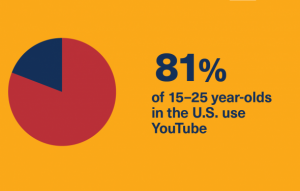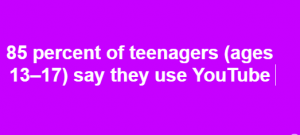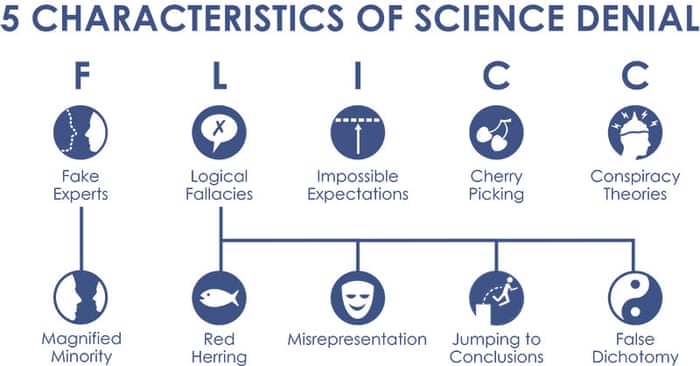Media Literacy & Science
MEDIA LITERACY IS ALSO IMPORTANT IN THE SCIENCE CLASSROOM
Media Literacy is ALSO Important in the Science Classroom
by Frank W Baker (March 2020)
“Houston, we have a problem” reported the Apollo 13 astronauts (more precisely they relayed the distressing phrase “Houston: we’ve had a problem here”) when a major technical problem was discovered. Thus began the painstaking job of fixing the problem and bringing the astronauts home safely in 1970.
America, we have ANOTHER problem and this one won’t be fixed anytime soon. It’s called “science illiteracy”—the failure of young people to think, or act, critically on information they receive from social media and YouTube. It’s also a failure of the American education system that teaching media literacy skills has not become a priority.
The problem was highlighted recently in “The War on Science” broadcast by CBSN—the online news network of CBS News. It appears that students, heavy viewers of YouTube, are coming into class woefully misinformed. Among other things, it is clear that some students believe the various conspiracy theories and misinformation (e.g. the flat earth; climate change hoax) that are propagated via social media. And they bring these misconceptions into the classroom.
“There are actors online who are willfully spreading misinformation”, said CBS reporter Adam Yamaguchi, “knowing that it’s misinformation, knowing that there’s this huge audience for it.” This huge audience to which he refers is YouTube, where more and more young people are getting their information. Everyday, millions of young people are logging on and watching YouTube videos.
Factoids:
 Source |
 Source: Pew Research quoted here Source: Pew Research quoted here |
After surveying science educators in 2016, researchers from Pennsylvania State University and the National Center for Science Education concluded that “The lack of teaching and the mixed messages about climate change leave schoolchildren more susceptible to disinformation about climate change spread by political or corporate interests once they enter adulthood” (Source)
“Science education is perhaps one of the best tools we have to help students resist that kind of misinformation,” said Ann Reid, executive director of the nonprofit science advocacy group the National Center for Science Education. Her organization has recently compiled lesson plans and other resources to help teachers combat the misinformation students are getting about climate change, for example.
One of the strategies promoted by the National Center for Science Education is teaching the Five Characteristics of Science Denial. Using the graphic (below) students are taught to identify one or more characteristics being used by the creators of the messages. Melissa Lau, a middle school science teacher from Oklahoma, featured in the CBSN news story, noted that it’s not just about science, but rather teaching them how to navigate the world that’s changing. She adds, “it’s a survival skill in this day and age.” (Source)
Are students coming to class putting more faith, and believing more, in YouTube videos than instruction from qualified teachers? That’s a question that needs to be considered.
The Next Generation Science Standards (NGSS) in collaboration with the National Science Teachers Association (NSTA) wrote in 2004 that students are expected to:
“Gather, read, and synthesize information from multiple appropriate sources and assess the credibility, accuracy, and possible bias of each publication and methods used, and describe how they are supported or not supported by evidence.” (Source) More recent evidence indicates today’s students have trouble assessing the credibility of information, so it’s clear more time needs to be spent helping students analyze sources.
To assist educators, three researchers have created a free, research-based, one-week curriculum unit for use in grades 6–12. It consists of four units: 1) Misleading Advertisements 2)Asking The Right Questions 3) Understanding Science and 4) Reliable Information.
“By teaching how to judge the quality of scientific claims encountered in media,” the researchers wrote, “teachers provide students with skills and dispositions that will serve them throughout their lives.” (Source)
Teachers face a host of challenges when it comes to instructing young people. The new challenge is the vast amount of information—or more precisely—the misinformation they are receiving from social media. Teaching healthy skepticism ought to be one of the goals.
Media literacy, which encourages the critical inquiry of media messages, becomes even more important. Unfortunately, it has been my experience that most educators have not had one minute of training in media literacy, so they are not prepared to help their students see through the techniques used by media makers.
[Teachers: Would media literacy training help you address the fact that young people are not thinking critically about online content? If so, contact me: fbaker1346@gmail.com ]
Recommended Resources:
Teaching Students to Resist Science Misinformation (study)
Resisting Science Misinformation Teacher Guide
Science Misinformation Seems to Thrive on YouTube
Lesson Plan: Fact or Phony? Scientifically Evaluating Data
Scientists Enlist Computers to Hunt Down Fake News
Infographic: The Best & Worst Science News Sites
How Technology Can Help Combat The Rising Tide of Fake Science
Misinformation is Everywhere: These Scientists Will Teach You How to Fight BS
Communicating Science Effectively: A Research Agenda
Understanding and Countering Misinformation About Climate Change
Here’s How Scientific Misinformation, Such As Climate Doubt, Gets Spread on Social Media
26 Million Americans Are Scientifically Illiterate
Media Literacy Questions Every Teacher & Student Needs To Consider
Guidng Students to Science Literacy
Combating Students Misconceptions
Suggested Websites for Using Media Literacy & Primary Sources in Science
ABOUT THE AUTHOR:
Frank W Baker has 20+ years of media literacy education background and experience. His workshops have been seen by thousands of educators nationwide. In addition to helping get media literacy into the teaching standards of South Carolina, he has also authored four books and blogs regularly at www.MiddleWeb.com . He also maintains the popular Media Literacy Clearinghouse website of resources for educators. He invites educators to follow MLC on Facebook and him on Twitter: @fbaker


